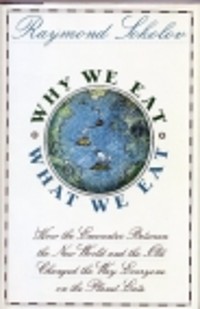Status
Available
Genres
Publication
New York, N.Y. : Summit Books, c1991.
Description
Sokolov says that Columbus greatly influenced our eating habits when such New World delights as tomatoes, chocolate, green beans, chili peppers, and maize were introduced into cuisine throughout the world and when the delicacies of the Old World found their way into the cooking pots of America. Sokolov is the Leisure & Arts Editor of The Wall Street Journal.
User reviews
LibraryThing member PhoebeReading
Raymond Sokolov's Why We Eat What We Eat is a fascinating account of the modern American diet. I've never read a book quite like it, and what immediately comes to mind isn't more food writing but rather Jared Diamond's Guns, Germs, and Steel, a more general history of why certain cultures (rather
Show More
than cuisines) came to be dominant. Sokolov's book is, likewise, concerned with domination, though here it's food rather than society that ultimately reigns supreme.Unfortunately, Sokolov's thesis is a bit hazy, and the organization of the book haphazard. Later chapters, especially, feel a bit like asides and could have easily been combined to create more balance overall. Nevertheless, Sokolov's prose and affection for the food in question, respectively, carry and unify this book. It's food porn to the nth degree, lovingly researched and written. It made me hungry for all sorts of things I've never eaten--persimmons and old varieties of apples and extinct key limes--and some things I have. Even with its imperfections, this is a really worthwhile read for both foodies and history buffs. Like an old-fashioned, mottled apple, Why We Eat What We Eat is tasty, despite its flaws. Show Less
LibraryThing member wealhtheowwylfing
Journalist Raymond Sokolov sets out to examine the origins of commons foods and dishes. Fascinating mix of anthropology, linguistics, genetic research, and gastronomy.
LibraryThing member MrsLee
Interesting, but not exactly compelling. The chapters on food migration between the new world and the old world dragged a bit, perhaps because most of it was not new information to me. The chapters on the effect of Colonization on the food habits of the native peoples, and those on individual new
Show More
world ingredients and their effect on the world both past and present were the most interesting for me. Those on the history and future of restaurant fine dining were less so, but informative none the less. Show Less
